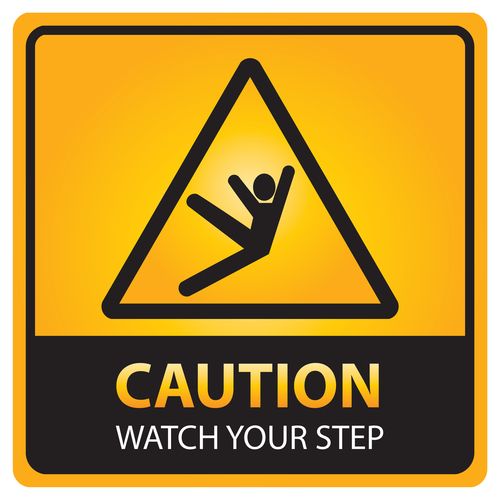Falling injuries in older adults
wHAT cAUSES THEM AND HOW CAN WE PREVENT THEM?
Anyone who has worked with older adults or has a loved one who is older surely has a fall story to tell. “I will never forget that phone call, telling me that my Mom had fallen and was being taken to the hospital in an ambulance,” said Kate Andrews, whose 74-year-old mother had never seemed unsteady before. “She was getting out of the car when she fell, hit her head and was unconscious for at least a minute.” Kate’s mother was lucky to escape with a minor concussion and a fracture of her eye socket, both of which healed without treatment.
Many older adults do not have such happy endings to their stories. Falls are the leading cause of death in American adults aged 65 and older. One of 3 adults in this age group falls each year, sustaining both physical injuries and emotional distress. Why are falls so common among older adults, and what can be done to help protect our loved ones?
Why are older adults so vulnerable?
Many factors make falling more common as we age. For one thing, along with aging often comes a more sedentary lifestyle. The lack of exercise leads to fatigue and muscle weakness, which can make it harder to recover from a small stumble. On top of this, as their health status declines, many people wind up taking medications for high blood pressure and other health conditions. A side effect of many of these medications is dizziness, which affects balance.
For adults with diabetes, the risk of developing neuropathy (nerve disorders) increases as they age. Nerve damage often appears in the feet, causing numbness, tingling, and weakness. These symptoms can appear gradually, making it harder for people to realize they are becoming debilitated until a fall happens. This kind of nerve damage can also occur in patients taking certain medications, including some common chemotherapy regimens.
Another condition that contributes to falls is orthostatic hypotension—the medical name for that dizzy “head-spinning” feeling that can occur when changing position from sitting to standing. It becomes more common as we age, particularly when taking certain medications, including high blood pressure treatments, some antidepressants, and muscle relaxants. Orthostatic hypotension can lead to fainting, but even without losing consciousness, the dizziness is enough to induce a fall. Using the Drive Easy Assist Pole can help anyone change positions safely and easily.
How can we help prevent falls?
One way to help prevent falls is to exercise and practice balance exercises. Using a Drive Exercise Peddler can help strength arms, legs and gait. Balance exercises can be as simple as holding onto a sturdy chair or table and lifting one leg, then letting go and balancing as long as possible that way (one minute is a good goal). Some light stretching or yoga can also help maintain flexibility and balance and make a big difference.
Since many falls happen in the home, look into simple ways to make the living space safer. For example:
- Standing in the kitchen preparing meals can be a hidden cause of muscle fatigue, which can lead to falling. Rather than give up on cooking, consider using a Drive Kitchen Stool while working at the kitchen counter and stove. The padded seat and back make it comfortable to use, and the adjustable height makes it versatile for people of different heights and for using in different areas of the kitchen.
- Bending over to pick things up off the floor or reaching to get items off high shelves can bring on an episode of dizziness caused by orthostatic hypotension. A simple way to avoid this is by using a reacher. With a lightweight frame and a trigger that requires only 7 ounces of pressure, the Hand Held Reacher makes it easy to avoid bending and stretching.
- It’s no secret that older adults are particularly vulnerable to falls in the bath. Luckily, it’s very easy to install Grab Bars or a Tub Rail that can make getting in and out of the tub or shower steadier and safer. Drive even makes models that install in seconds using suction cups, so there’s no need to wait to be safe.
Staying mobile while staying safe
When a person has balance issues, a short trip out of the house can become filled with anxiety and fraught with danger. Using a cane helps make walking safer and can restore lost confidence. The All Terrain Cane has four easily retractable spikes to help maintain a grip on slippery surfaces, even in the rain. The Lightweight Adjustable Folding Cane is a great solution for anyone who does not need a cane every day, but wants to be prepared while traveling.
For someone who needs more consistent help walking, there’s nothing more reliable than a rollator. With four wheels and hand brakes, a rollator allows the user to walk with a normal motion while providing support and assurance that prevents misstep. The Nitro Aluminum Rollator is sturdy but lightweight, highly adjustable, and even comes in stylish colors. It folds up easily and quickly to store in a car, so there’s no reason to ever chance going without it.
The facts are clear: aging does put limitations on our bodies, and the risk of falling increases as we get older. But falling is not a foregone conclusion, and with the right safety measures, we can help keep ourselves and our loved ones safer as we age.

Drive's Fall Prevention resource page
View our fall prevention resource page to see more related articles.
Explore all of our Bathroom Safety options
Drive offers a wide range of bath benches, grab bars and more to fit your specific safety needs in the bathroom.
With the right products, older adults can stay both active and safe.





